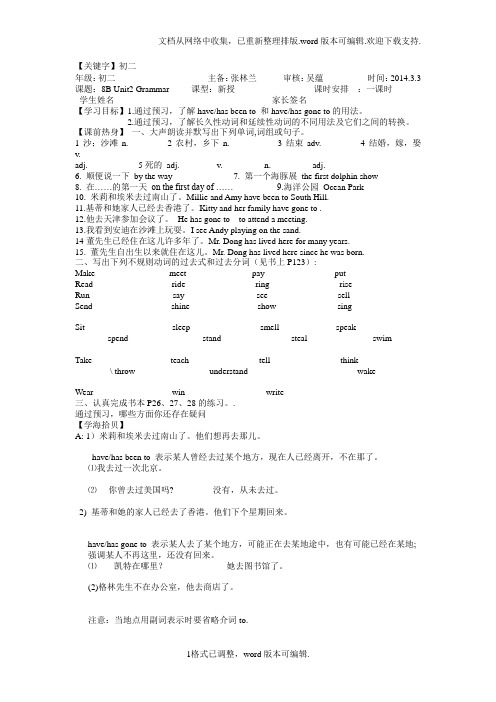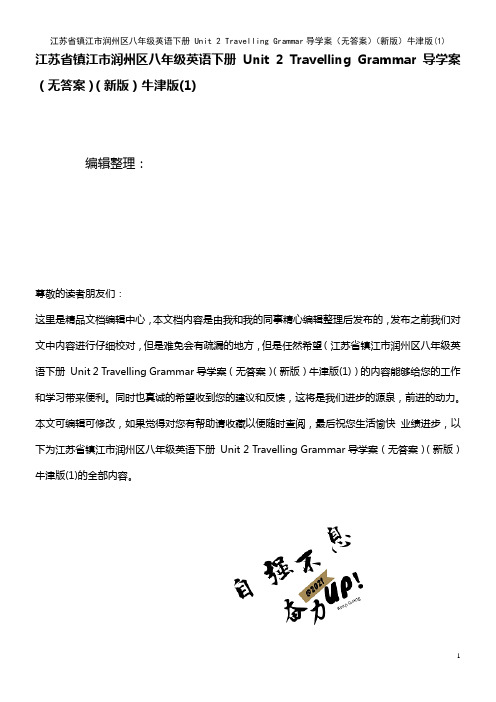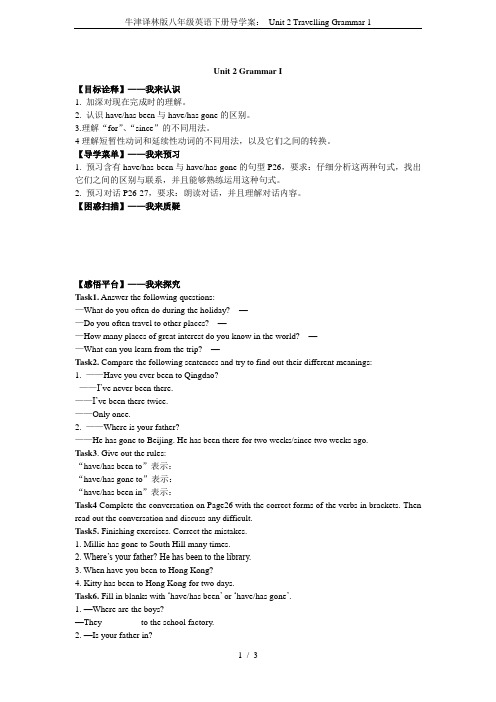牛津英语八年级下册Unit 2 Grammar导学案
- 格式:doc
- 大小:613.50 KB
- 文档页数:4


【关键字】初二年级:初二主备:张林兰审核:吴蕴时间:2014.3.3 课题:8B Unit2 Grammar 课型:新授课时安排:一课时学生姓名家长签名【学习目标】1.通过预习,了解have/has been to 和have/has gone to的用法。
2.通过预习,了解长久性动词和延续性动词的不同用法及它们之间的转换。
【课前热身】一、大声朗读并默写出下列单词,词组或句子。
1沙;沙滩n. ______ 2农村,乡下n. ________ 3结束adv. ______ 4结婚,嫁,娶v._________adj.___________ 5死的adj.________ v._________ n._________ adj.______________6. 顺便说一下by the way7. 第一个海豚展the first dolphin show8. 在……的第一天on the first day of …… 9.海洋公园Ocean Park10. 米莉和埃米去过南山了。
Millie and Amy have been to South Hill.11.基蒂和她家人已经去香港了。
Kitty and her family have gone to .12.他去天津参加会议了。
He has gone to to attend a meeting.13.我看到安迪在沙滩上玩耍。
I see Andy playing on the sand.14董先生已经住在这儿许多年了。
Mr. Dong has lived here for many years.15. 董先生自出生以来就住在这儿。
Mr. Dong has lived here since he was born.二、写出下列不规则动词的过去式和过去分词(见书上P123):Make________ ________ meet______ ________ pay_________ ______ put________ _______ Read________ _________ ride_______ ________ ring________ _______ rise________ _______ Run_________ _________ say________ ________see ________ _______sell ________ _______ Send________ _________ shine_______ ________show_______ ______ sing _______________Sit__________ _________ sleep_______ ________ smell ______ ______speak_______________ spend_______ _________ stand _______ ________steal________ ______ swim_______ ________Take________ _________ teach________ _______ tell_________ ______ think________________\ throw________ ________ understand ____________ ____________wake_________ ________Wear_________ ________ win_________ _______ write_______ _______三、认真完成书本P26、27、28的练习。


江苏省镇江市润州区八年级英语下册Unit 2 Travelling Grammar导学案(无答案)(新版)牛津版(1)编辑整理:尊敬的读者朋友们:这里是精品文档编辑中心,本文档内容是由我和我的同事精心编辑整理后发布的,发布之前我们对文中内容进行仔细校对,但是难免会有疏漏的地方,但是任然希望(江苏省镇江市润州区八年级英语下册Unit 2 Travelling Grammar导学案(无答案)(新版)牛津版(1))的内容能够给您的工作和学习带来便利。
同时也真诚的希望收到您的建议和反馈,这将是我们进步的源泉,前进的动力。
本文可编辑可修改,如果觉得对您有帮助请收藏以便随时查阅,最后祝您生活愉快业绩进步,以下为江苏省镇江市润州区八年级英语下册Unit 2 Travelling Grammar导学案(无答案)(新版)牛津版(1)的全部内容。
Unit 2 Grammar【课前导学】判断正误:lie has gone to South Hill many times。
( )2.Where's your father? He has been to the library。
( )3.When have you been to Hong Kong?()4.Kitty has been to Hong Kong for two days。
()5.He has left Beijing for a week. ()6.He has not left Beijing yet. ( )7.He has bought a car since 2007。
( )8.He has had a car since 2007. ()【课堂学习】1.Step One :Leading – in2. Watch and Find3。
Discuss and Work out the rules:(Group work)(一)1。
have been to 和have gone to的区别have been to 强调“去过”,现已不在那里如:He______ ________ ________ the USA ________.他到美国去过两次。

Unit 2 Grammar I【目标诠释】——我来认识1. 加深对现在完成时的理解。
2. 认识have/has been与have/has gone的区别。
3.理解“for”、“since”的不同用法。
4理解短暂性动词和延续性动词的不同用法,以及它们之间的转换。
【导学菜单】——我来预习1. 预习含有have/has been与have/has gone的句型P26,要求:仔细分析这两种句式,找出它们之间的区别与联系,并且能够熟练运用这种句式。
2. 预习对话P26-27,要求:朗读对话,并且理解对话内容。
【困惑扫描】——我来质疑_______________________________________________________________________________ _______________________________________________________________________________ _______________________________________________________________________________ _______________________________________________________________________________ _______________________________________________________________________________ 【感悟平台】——我来探究Task1. Answer the following questions:—What do you often do during the holiday? —_____—Do you often travel to other places? —_____—How many places of great interest do you know in the world? —_____—What can you learn from the trip? —_____Task2. Compare the following sentences and try to find out their different meanings:1. ——Have you ever been to Qingdao?——I’ve never been there.——I’ve been there twice.——Only once.2. ——Where is your father?——He has gone to Beijing. He has been there for two weeks/since two weeks ago.Task3. Give out the rules:“have/has been to”表示:________________________________“have/has gone to”表示:________________________________“have/has been in”表示:________________________________Task4 Complete the conversation on Page26 with the correct forms of the verbs in brackets. Then read out the conversation and discuss any difficult.Task5. Finishing exercises. Correct the mistakes.1. Millie has gone to South Hill many times.2. Where’s your father? He has been to the library.3. When have you been to Hong Kong?4. Kitty has been to Hong Kong for two days.Task6. Fill in blanks with ‘have/has been’ or ‘have/has gone’.1. —Where are the boys?—They ________ to the school factory.2. —Is your father in?—No. He ________ to Shenzhen.—______ he ever _______ there before?—Yes, he _______ there several times.3. He asks me if I ________ to Hangzhou before. I tell him that I want to go there for a visit as I _______ never ______ to that city before.4. —Where’s tony?—He’s got a cold, so he ________ to bed.5. —Can I have an apple, please?—Sorry, we ________ not _______ to the fruit shop today.Task7 Practising. Tell if the following sentences are true or false.1. He has bought a bike for two years.2. She has already left Beijing.3.She has been away from Beijing for 2 days.4.Simon has joined the Reading Club since 2000.5. His grandfather has died for 3 years.6. When have they got married?【建立网络】——我来归纳_______________________________________________________________________________ _______________________________________________________________________________ _______________________________________________________________________________ _______________________________________________________________________________ _______________________________________________________________________________ 【过关窗口】——我来练习一、单项选择( )1. Not only his parents but also his grandfather ________ to a lot of places of interest in our country since they came here,A. has goneB. has beenC. have goneD. have been( )2. —How long has Eliza been a nurse?—________.A. Since 2002B. Four years agoC. In 2002D. For 2002 ago( )3. I met him just a moment ________.A. agoB. beforeC. sinceD. now( )4.—How long ______ he ______ a fever?—Ever since last night.A. have, gotB. have , hadC. have, caughtD. did, have( )5. I ______ you for a long time. Where ______ you ______?A. didn't seen; did, goB. didn't see; have, goneC. haven't seen; have, beenD. haven't seen; have gone( )6. I have ______this iphone5 for two months.A.buyB.boughtC.hadD.have( )7. How long have you ______ the football team.A.joinB.joinedC.beenD.been a member of二、用所给动词的过去进行时填空。

牛津译林版八年级英语下册导学案Unit2 Travelling Grammar(导学案)学习目标:1.学会正确使用have\has been to 和have\has gone to.2.学会正确区分短暂性动词和延续性动词。
3.会根据不同的语境正确使用短暂性动词和延续性动词。
4.学会短暂性动词在与for和since 连用时的变化形式。
Pre-task(自主学习): 1.写出下列动词的过去式和过去分词并熟记。
1.teach _______ ________2.stop _______ ________3.get _______ ________4.leave _______ ________5.die_______ ________6.go ______ ________7.hold _______ ________ 8.begin_______ ________ 9.keep_______ ________2.了解have \has been 和have\has gone的含义:have \has been表示:__________________________________________________.have\has gone表示:___________________________________________________.3.尝试掌握短暂性动词所对应的延续性动词。
begin\start____________ finish\stop_____________ come\go _______________________leave________________ borrow_______________ join_________ _______________marry________________ die ___________________ open________________________Post-task(课堂反馈)一、选择题( )1.---Is that Sandy speaking? ---Sorry, she isn’t in. She the cinema with her aunt.A. has been toB. has been inC. wentD. has gone to( )2.---So far, how long you China? ---For more than three years.A. have, come toB. have, been toC. have, been inD. have, gone to( )3. Where are my clothes? I them here just now.A. tookB. have putC. putD. have taken( )4.--- has Liu Xiang taken part in the world competition?---I’ve no idea. Let’s find it on the Internet.A. How longB. How many timesC. How soo nD. How often( )5.---Have you learned English? ---Yes, I’ve learned a lot.A. never, everB. ever, neverC. ever, alreadyD. already, ever( )6.---Have you finished your homework ? ---Yes, I’ve done that .A. yet, alreadyB. already, yetC. ever, neverD. still, just( )7.--- you ever to Nanjing? ---Yes, I there last yearA. Have, gone; have goneC. Did, go; went B. Have, been; wentD. Did, go; has been( )8.Mr Smith was writing a book about China last year but I really don’t know whether heit.A. finishedB. will finishC. was finishingD. has fini shed( )9.---Did you have a good time at the party?---Yes, indeed. It’s years I enjoyed myself so much.A. sinceB. whenC. beforeD. for( )10. You may go to play football if you homework.A. will finishB. finishesC. has finishedD. finished二、翻译下列各句(可以用多种方法)。
Unit2 Travelling Grammar (Ⅱ)教案主备教师许热授课日期课型New 班级课题Unit2 Travelling Grammar (Ⅱ)教学目标知识技能:To consolidate the present perfect tense过程与方法:To understand the verbs with continuous time adverbials 情感态度价值观:To love travellimg教学重点Verbs with ‘for’, ‘since’ or ‘ago’教学难点Verbs with ‘for’, ‘since’ or ‘ago’集体备课个人修改教学过程一、创设情境、导入新课Step One :Leading – in1.Ask the students what we learned yesterday to review t he structure of pastcontinuous tense.2.Read the passage below, find how many sentences written in this tense.There w as a robbery at 151 River Street yesterday afternoon. Someone brokeinto every flat in the building when all were out.The man in Flat 1 wasn’t home. He was washing his clothes at the Laundromat( 洗衣店). The woman in Flat 2 wasn’t home either. She was visiting a friend in the hospital. The people in Flat 3 were gone. They were having a picnic at the beach.The man in Flat 4 was out. He was playing tennis in the park. The college students in Flat 5 were away. They were watching a football game. And the elderly lady in Flat 6 wasout of town. She was visiting her grandchild.Yesterday certainly was an unfortunate day for the people at 151 River Str eetThey had no idea that while they were away, robbers broke into every apartment in thebuilding3. Raise some questions about this passage.e.g. What was the man in Flat doing when the robbery happened?While the college students in Flat 5 were watching a football game, what was thewoman in Flat 2 doing?Write the structures on the Bb:1. When + did sth., was/were doing sth.2. While + was/were doing sth., was/were doing sth.二、预习设计、成果展示Step Two :按要求改写句子。
牛津译林版英语八年级下册U2Grammar教案《英语》(八年级下册)Unit 2 TravellingGrammarI. Teaching aims and learning objectives:By the end of the lesson, students should be able to:1.know the usages of have/has been and have/has gone;/doc/1b18482048.html,e for and since to express a period of time in the present perfect tense;/doc/1b18482048.html,e proper verbs to show a continuous state in the present perfect tense.II. Teaching contents:1.New words and phrases: sand, over, marry, dead, on the first day of, dolphin show2.New structures: Millie and Amy have been to South Hill.Kitty and her family have gone to Hong Kong.I see Andy playing on the sand too.Mr Dong has lived here for many years.Mr Dong has lived here since he was born.III. Focus of the lesson and predicted area of difficulty1.The difference between have/has been and have/has gone, for and since.2.Verbs used for a continuous state.IV. Teaching proceduresA Using have/has been and have/has goneStep 1 Presentation & observation1. Present have/has been by self-introductionT: I like travelling very much. I have been to many places. Look! Where have I been to? Yes, Hong Kong.T: I went there on 16th February and stayed there for one week. T oday is 17th March, and I am already back. So I can say I have been to Hong Kong.T: I have also been to Hainan and I have been to Xi’an twice, but I have never been toMaldives.【设计意图:教师通过介绍自己的旅行经历,向学生输入目标语法:have/has been to。
牛津英语(新版)八年级下册Unit 2 Grammar导学案
教学目标
1) 掌握动名词的基本概念和构成。
2) 掌握动名词作主语和宾语的基本用法。
教学重点
掌握动名词作主语和宾语的基本用法
前置作业
1.将下列动词变为-ing 形式,并总结规律:
begin---- communicate---- listen-----
dance---- hold---- visit-----
sigh---- study---- see-----
动名词的构成
1)、动名词的构成:
①. 一般在词尾加____________ 如:work-working
②以不发音e结尾的词____________ 如:make-making
③.以重读闭音节结尾,只有一个辅音字母结尾的词________________________ 如:put-putting
④.特例:lie—die—
课中导学
1.检查前置作业1.
2、动名词作主语和宾语的基本用法(依据前置作业2.)
A 动名词作主语
1)、请观察下面的句子,完成下面的空格。
①Smiling shows that you are happy.
②Ballet training usually starts at an early age.
③Dancing is her favourite hobby.
▲动名词作主语时,谓语动词用________(单数/复数)。
如:Communicating is not just speaking. ▲两个或两个以上不同的动名词作主语,谓语动词用________(单数/复数)如:Playing computer games and playing basketball are my favourite hobbies.
2)、In pairs, ask and answer questions about the pictures. Follow the example.
S1: What can shaking your closed hand show?
S2: Shaking your closed hand can show that you are angry.
shake your closed hand/angry rest your head on your hand/bored
sigh/sad close your eyes/thinking
B. 动名词作宾语
1)、请观察下面的句子。
①Debbie enjoys smiling and always looks friendly.
②He denied stealing my bike.
③He is interested in playing chess.
▲英语中有一些动词(短语)后面常接动名词作________。
如:enjoy(like,love) , suggest ,mind,finish,practise,deny,avoid,admit,keep,miss
2)、In pairs, ask and answer questions about the pictures. Follow the example
S1: What does the boy enjoy?
S2: He enjoys reading books.
enjoy/read books practise/climb mountains
be good at/ski be interested in/play chess
▲常见的“动词+介词+动名词”的短语有:prefer... to, be used to doing sth, look forward to , feel like, give up, keep on, insist on, succeed in等。
例如:
你必须马上戒烟。
You must give up smoking at once
他不想做家庭作业。
He doesn’t feel like doing his homework.
▲用于某些惯用法中。
例如:
(1)be busy doing sth “忙于做某事”
妈妈在厨房忙着做饭。
译文:_____________________________________________
(2) be worth doing sth “值得做某事”
这本书值得一读。
译文:_______________________________________________
(3) It’s no use / good doing sth
“做……无用/ 无好处”
向他寻求帮助没有用。
译文:__________________________________________________
强化练习
一、选择最佳答案填空。
( ) 1. They insisted on ___ another chance to try.
A. got
B. getting
C. being got
D. to be got
( ) 2. Jack said that he wouldn’t mind ____ for us.
A. to wait
B. wait
C. waiting
D. waited
( ) 3. My brother keeps ____ my favourite book. And I want it back!
A. to take
B. take
C. taking
D. took
( ) 4. We should often practise ____ English
with each other.
A. to speak
B. spoke
C. speak
D. speaking
( ) 5. What about ____ to the concert with us?
A. we go
B. we going
C. going
D. to go
( ) 6. Only one of these books is worth ____.
A. to read
B. being read
C. of reading
D. reading
( ) 7. She is very busy ____ her papers. She is too busy ____ shopping.
A. to write; to go
B. writing; to go
C. writing; going
D. to write; for goin g
二.用所给动词的正确形式填空。
1. The film is worth _________ (see).
2. _________ (smoke) is forbidden in class.
3. The key is for _________ (lock) the door.
4. They are looking forward to _________ (travel) to Beijing.
5. _________ (do) more exercise is good for our health.
6. What about _________ (go) for a walk?
三.完成句子。
1. 天天做早操有利于我们的健康。
_________ _________ _________ every day _________ good for our health.
2. 保持教室清洁是我们的职责。
_________ _________ _________ clean _________ our duty.
3. 跑步和爬山通常是年轻人的爱好。
_________ and _________ _________ always young people’s hobbies.
4. 他们去看电影了而不是看电视。
They went to see a film instead of _________ _________ .
5. 这件衬衣该洗了。
This shirt needs _________。